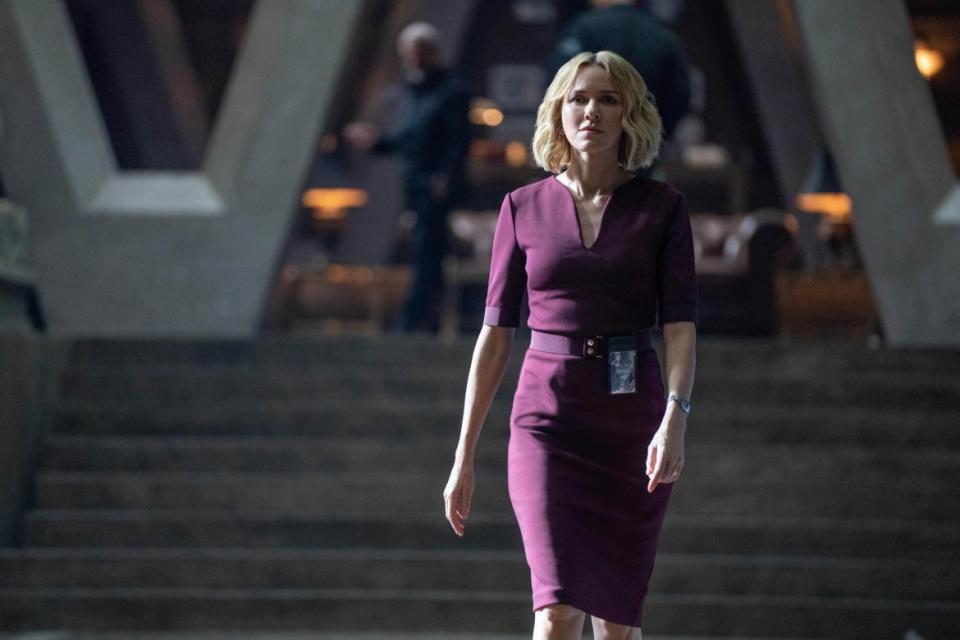WTF Happened to Naomi Watts?

Even with the noxious Mel Gibson as its villain and a story driven by a tired Groundhog Day conceit, Boss Level (on Hulu on March 5) is a reasonably lively video game adventure about an ex-Special Forces soldier (Frank Grillo) stuck reliving the same action-packed day over and over again until he finds a way to defeat his assassin adversaries, kill Gibson, and escape his 24-hour time loop. Much of the B-movie’s success is due to Grillo’s smarty-pants macho routine, but none of the credit goes to Naomi Watts, here relegated to playing Grillo’s scientist ex, who’s responsible for developing the high-tech device that created this re-running fiasco, and whose death at Gibson’s hands is what compels Grillo to try to reach his coin-op reality’s final stage.
In other words, she’s the “woman in the refrigerator”—the disrespected female character who’s unceremoniously dispatched by the storytellers in order to give the hero guiding motivation. That she has only slightly more screen time in this affair than NFL tight end Rob Gronkowski merely adds insult to injury.
Breaking Down ‘WandaVision’s’ Thrilling, Easter Egg-Filled Finale
Appearing for only a few expositional scenes that underline her character’s status as a one-dimensional narrative device, Watts is not served well by the gung-ho Boss Level. Then again, that’s not a unique situation for the 52-year-old Australian to find herself in, especially over the past decade. Though capable of more than handling her own in dramas and comedies, small-scale chamber pieces and CGI-enhanced spectacles, the Oscar-nominated actress has had her talents wasted in recent years by a string of misfires that were either middling or misbegotten from the start, or inept at properly utilizing her. Whether the result of faulty instincts or shoddy guidance from others, Watts’ career has gotten more than a bit off track as of late—a state of affairs that need not continue, so long as she begins gravitating toward the types of projects that made her an A-lister in the first place.
Watts’ multifaceted gifts were apparent from the moment she burst onto the marquee scene in 2001 in David Lynch’s masterful Mulholland Drive. As Betty, a perky aspiring actress who, shortly after arriving in Hollywood, winds up in the middle of a surrealist mystery involving an amnesiac beauty (Laura Elena Harring), Watts was many things at once: sunshiny and wholesome, curious and innocent, passionate and fractured, and ultimately damaged and self-destructive. In Lynch’s hands, Watts was given the opportunity to demonstrate the full range of her abilities, and in both the film’s early passages as Betty, and in its later, revealing segments as Diane (a far less glamorous doppelganger who may have been imagining Betty all along), Watts was dynamic, electric. A star was immediately, and rightly, born.
A series of strong efforts ensued. She headlined Gore Verbinski’s 2002 hit remake The Ring and earned her first Best Actress Oscar nod for 2003’s 21 Grams. She showed off her humorous chops in David O. Russell’s I Heart Huckabees, and ably stepped into the shoes of Fay Wray (and Jessica Lange) as the object of simian affection in Peter Jackson’s 2005 remake of King Kong. She did great, understated work opposite Edward Norton in the romantic period-piece The Painted Veil, and Viggo Mortensen in 2007’s stellar David Cronenberg underworld drama Eastern Promises. That same year, she gave arguably the finest performance of her career in Michael Haneke’s shot-for-shot English-language do-over of his seminal self-conscious thriller Funny Games. And in the immediate years following that superb turn, she continued to prove her dexterity in films as diverse as J.A. Bayona’s The Impossible (earning her second Best Actress Oscar nod) and Alejandro G. Iñárritu’s Oscar-winning Birdman or (The Unexpected Virtue of Ignorance).
To be sure, there were some clunkers scattered throughout Watts’ filmography (Dream House, I’m looking squarely at you). But it’s in the aftermath of Birdman that things have taken a relative nosedive. Be it the cornball Bill Murray vehicle St. Vincent, the leaden Divergent franchise (which was never even completed thanks to fan disinterest), Gus Van Sant’s dreadful The Sea of Trees, or the disastrous The Book of Henry—a venture so ill-conceived it became a running internet punchline, and reportedly got writer/director Colin Trevorrow booted from Star Wars Episode IX—Watts’ output over the last 10 years has been rocky, to say the least. Forgettable indies like 3 Generations, Demolition and The Glass Castle didn’t help, nor did her one-season-and-done Netflix series Gypsy, or her more recent feature for the streaming service, Penguin Bloom, in which she forms a special bond with a magpie.
Watts isn’t solely responsible for the dreariness of these duds, which couldn’t have been salvaged by any actress. Moreover, Watts remains excellent when given strong material with which to work. For confirmation of that, one need only check out 2019’s Luce, in which she’s sterling as a mother faced with a racially charged crisis involving her adopted son, as well as 2017’s Twin Peaks: The Return, in which she’s charming, droll and altogether fantastic as Janey-E Jones, the suburban housewife of Kyle MacLachlan’s spacey Dougie Jones. Reunited with Lynch (with whom she also teamed for Rabbits and Inland Empire), Watts seems wholly in her element, nimbly vacillating between comical, earnest, and grave registers. Sixteen years removed from their maiden collaboration, Watts reconfirmed with Twin Peaks: The Return that she had lost none of her versatility, and furthermore, that she was still capable of showing it all off in the same part.

Naomi Watts in Boss Level
Compared to that triumph, Boss Level feels like an even bigger waste of the actress, who deserves better than being squandered in juvenile aggro ventures as the cardboard cut-out love interest. One might have assumed a comeback was in the cards via Bloodmoon, the Game of Thrones prequel she was slated to star in, yet its unceremonious post-pilot cancellation has instead wound up being another recent disappointment. As her career bears out, Watts (like many others) thrives when partnering with legitimate auteurs (Lynch, Cronenberg, Iñárritu), and largely winds up adrift when she’s not. Of course, nabbing such coveted projects is easier said than done, especially in ageist and sexist Hollywood, and it’s possible that her upcoming This is the Night—a drama that pairs her with The Purge’s James DeMonaco, as well as Grillo and Bobby Cannavale—may turn out to be just the mainstream hit she needs.
What is certain, however, is that Watts is a charismatic star who would do well to pick her endeavors more wisely going forward. And as Boss Level confirms, avoiding Mel Gibson movies is always a good place to start.
Get our top stories in your inbox every day. Sign up now!
Daily Beast Membership: Beast Inside goes deeper on the stories that matter to you. Learn more.

 Yahoo Finance
Yahoo Finance 